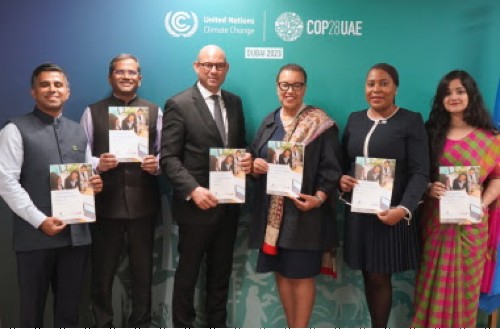Report Recommends Young People Get a Fair Access to Climate Financing
DUBAI – A report published by the London-based Commonwealth Secretariat and by YOUNGO, the children and youth constituency of the United Nations Framework Convention on Climate Change (UNFCCC), says young people, who are among those most at risk to the impacts of climate change, are not accessing the funds they need to tackle the challenges posed by global warming.
 Commonwealth Secretary General Patricia Scotland (third from right) and other officials at launch of the report (Commonwealth Secretariat photo)The report was launched at a side event at the ongoing United Nations Climate Change Conference (COP 28) that ends here on Tuesday.
Commonwealth Secretary General Patricia Scotland (third from right) and other officials at launch of the report (Commonwealth Secretariat photo)The report was launched at a side event at the ongoing United Nations Climate Change Conference (COP 28) that ends here on Tuesday.
Speaking at the event titled “Empowering Youth Leadership: Experiences from the Commonwealth in Access to Climate Finance, Capacity Building and Technology,” Commonwealth Secretary General, Patricia Scotland said the report reveals the dire need to scale up financial support for young people and prevent them from being stuck in the vicious cycle of chasing funds.
“We must work together with young people to address the barriers they face in accessing climate finance and support them in scaling contributions to meeting climate targets. This is essential to our belief that youth-led action is integral to our pursuit for a sustainable future for all.”
She said young people, who make up 60 per cent of Commonwealth citizens, are on the frontline of the climate crisis, living mostly in areas prone to extreme weather events.
“As a result, many are facing job losses, displacement, health issues and educational setbacks. In the face of adversity, the resilience of young people shines through as they harness their drive and talent to lead on powerful climate solutions,” Scotland added.
The joint report, while it shows an increase in youth-focused climate finance, the funds are mainly disbursed in small amounts, hindering large-scale youth-led climate action.
In addition, the audit information provided by funders lacked full transparency, especially about beneficiaries and what projects were funded.
In response, the report calls for a fit-for-purpose approach to deploying climate finance for youth-led actions to remove existing barriers and ensure young people receive a fair share of support.
The proposed solutions include targeted reporting, a streamlined process for accessing funds with a focus on clear eligibility criteria, increased private sector support and new innovative financing sources.
Climate finance, a core part of the Paris Agreement is provided to help developing countries cut greenhouse gas emissions and adapt to the impacts of climate change.
The Commonwealth Secretariat said that the “Availability of Climate Finance for Youth” report will inform its ongoing work, especially its Commonwealth Climate Finance Access Hub, which has supported small and vulnerable countries to access about US$322 million of climate finance for projects to mitigate and adapt to the impacts of climate change.


